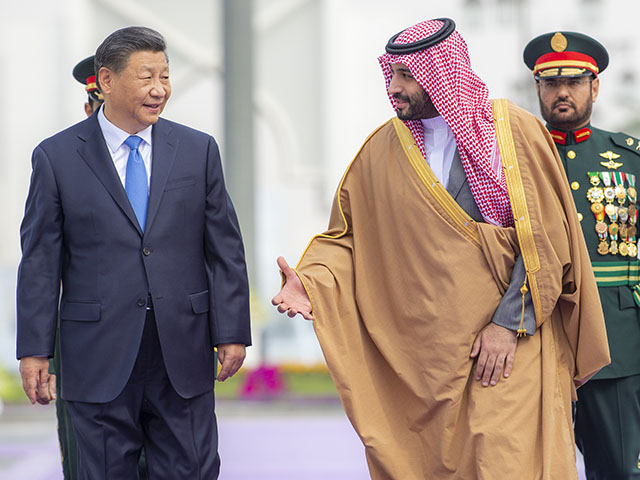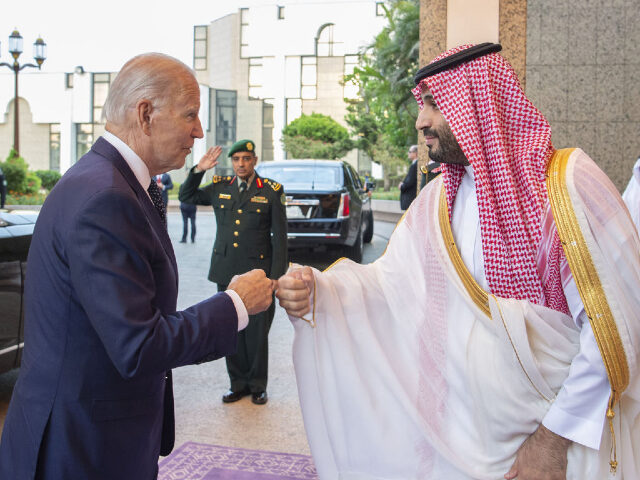Political leaders in Saudi Arabia are pressing the administration of leftist President Joe Biden to help the country develop a nuclear program as part of a larger “security” deal that may ultimately include a pathway to normalizing ties with Israel, Reuters reported on Monday.
The discussions regarding helping Riyadh develop nuclear energy, potentially the construction of a reactor and uranium enrichment capacity, reportedly occurred during National Security Adviser Jake Sullivan’s visit to Saudi Arabia and Israel this weekend. Sullivan met with Saudi Crown Prince Mohammed bin Salman on Sunday to discuss “strategic relations” between Washington and Riyadh, according to the Saudi Ministry of Foreign Affairs, and the “nearly final version of the draft strategic agreements between” the two countries. Sullivan then traveled to Israel to further conversations about such a deal with officials there.
WATCH — Rhodes: Biden Has Shown Saudis Can Buy a Reputation with Oil, Money, They’re Taking Advantage of Energy Situation:
The White House described the Saudi agreement in process as part of a “comprehensive vision for an integrated Middle East region,” suggesting the potential of an agreement regarding Saudi Arabia’s relationship with Israel.
Reuters cited an unnamed “senior U.S. official” on Tuesday who told the outlet that the latest version of the “strategic” agreement with Saudi Arabia “includes a civil nuclear component.”
“The senior official said on Tuesday that the deal would include U.S. civilian nuclear cooperation for the Saudis structured by nonproliferation experts in a ‘rigorous way,'” Reuters reported.
The official was not optimistic that the Saudis would sign onto the deal anytime soon.
“It is not done. Nobody here is going to say this is, you know, just right around the corner,” the anonymous “official” was quoted as saying.
The Saudi news agency al-Arabiya, relying in part of Reuters’ reporting, described the draft agreement as potentially including the purchase of “advanced F-35 fighter jets and other weapons” by Riyadh. It relayed similar information regarding the kingdom’s interest in American help with developing a nuclear program.
The Saudi Foreign Ministry itself was less forthcoming, claiming the crown prince talked to Sullivan about enhancing ties “in various fields,” with little elaboration.
Regarding the ongoing war between Israel and the Iran-backed jihadist terrorist organization Hamas, the Foreign Ministry said Sullivan and Mohammed bin Salman “reviewed the work of the two sides on the Palestinian issue to find a credible pathway towards the two-state solution in a way that meets the aspirations of the Palestinian people and their legitimate rights.”
“They also discussed the latest developments in the region, including the situation in Gaza. and the need to stop the war and facilitate the entry of humanitarian aid,” the statement from the Saudi government concluded.
Reuters described the draft deal as a part of a greater plan by the Biden administration to discourage Saudi Arabia from relying on China for weapons purchases and other security needs. Relations with Saudi Arabia have soured dramatically – creating a major opportunity for American enemies such as China – under Biden, as the U.S. president vowed to turn the Mideast country into a global “pariah” during his 2020 campaign for president.
WATCH — Maher: We Now Have an Iran, China, Russia Axis of Evil and Biden Pushed Saudis Towards China:
Biden has aggressively acted against Saudi interests, halting “offensive” weapons sales and emboldening Saudi Arabia’s top geopolitical rival, Iran, through massive cash windfalls and the removal of Ansarallah, a Yemeni terrorist organization commonly known as the Houthis, from the State Department’s list of foreign terrorist organizations. The Houthis have presented a border threat for Saudi Arabia for years, on occasion attempting to bomb Saudi oil facilities.
Despite Biden’s policy decisions, as recently as September, Mohammed bin Salman suggested that a deal to normalize relations with Israel was on the horizon, presumably with the aid of the United States. In an interview with Fox News in September, the crown prince said that “solving” the “Palestinian issue” was the greatest roadblock to normalization with Israeli, but that the Saudi government hoped “that will reach a place, that it will ease the life of the Palestinians, get Israel as a player in the Middle East.” Bin Salman notably did not mention the establishment of a Palestinian state as a requirement for Israel to establish diplomatic ties with his country.
The Saudi government has openly expressed interest in nuclear development for over a decade. Prior to Mohammed bin Salman becoming crown prince – and de facto ruler of the country – Saudi officials issued a royal decree in 2010 calling nuclear energy “essential to meet the Kingdom’s growing requirements for energy.” In 2016, the Chinese Communist Party signed an agreement with Saudi Arabia to help it develop a nuclear reactor, promised to begin its functions in 2022 but never materializing. A year later, Saudi officials announced a plan to dramatically increase domestic nuclear production.

Chinese President, Xi Jinping (L) is welcomed by Crown Prince of Saudi Arabia Mohammed bin Salman Al Saud (R) at the Palace of Yamamah in Riyadh, Saudi Arabia on December 8, 2022. (Royal Court of Saudi Arabia/Anadolu Agency via Getty Images)
Multiple reports during the term of American former President Donald Trump suggested the White House at the time was interested in aiding Saudi nuclear ambitions. At least one report, in 2019, claimed that the Saudi government was a “year away” from getting its first nuclear reactor online.
None of these projects materialized, however – the Chinese reactor never went online and, as of December, the International Atomic Energy Agency (IAEA) affirmed that Saudi Arabia does not have a functional reactor. IAEA chief Rafael Grossi did say at the end of 2023, however, that the first reactor, built with help from Argentina, was “almost complete.”
“Of course there are a few regulatory aspects that need to be taken care of because from the moment Saudi has a research reactor, we will have to have a comprehensive safeguards agreement in place,” Grossi said.
Saudi Arabia has long maintained that it is only interested in peaceful nuclear development, but warned that any breakthrough in Iran’s illegal nuclear weapons program would change that status quo.
“Without a doubt, if Iran developed a nuclear bomb, we will follow suit as soon as possible,” Mohammed bin Salman told CBS News in 2018.

COMMENTS
Please let us know if you're having issues with commenting.